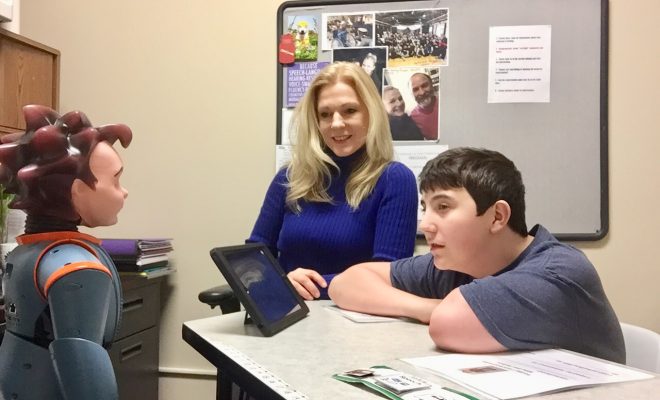What gets students motivated to work harder? Not money

Matthew G Springer, Vanderbilt University
Rewarding teachers financially for student achievement is an increasingly common practice, despite mixed evidence as to whether it improves results. Some scholars have instead suggested paying students.
But giving kids cash for grades and scores hasn’t proved straightforward either. So maybe the answer isn’t monetary.
Could students be better motivated by something as simple as a little formal recognition?
While I was serving as director of the National Center on Performance Incentives at Peabody College of Vanderbilt University, my colleagues and I sought answers in the decisions of various actors in American public schools.
The results may surprise you.
Which incentives encourage positive behavior?
Much of public policy can be characterized as attempts to influence individual behavior and decision-making in organizations.
Those who design and evaluate incentives typically operate under the crude assumption that the “target” is a rational actor (processing all available information and quickly identifying the behavior most likely to be the best one for his or her well-being).
So, policymakers end up offering seemingly beneficial public services at little or no cost. But they still meet with disappointment.
Our recent study attempted to better understand the response to a different kind of incentive – for one of the arguably more imperfectly rationale segment of our population: early adolescents.
We explored how incentives – monetary and nonmonetary – might encourage behaviors that lead to increased student learning, such as daily attendance and afterschool tutoring services (free but chronically underutilized).
We found that adolescents do not respond to incentives in ways that can be easily predicted by economic theory. But the right kinds of incentives could well lead adolescents to engage in behaviors likely to enhance their learning.
Money makes no difference
Here’s how we did our study.
We selected 300 fifth to eighth grade students in a large southern urban school district who were eligible for free, afterschool tutoring services.
Prior research had shown that these particular tutoring services were relatively high quality and had, in fact, increased student’s test score performance. We then randomly assigned these students to one of three groups:
- a reward of US$100 (distributed via an online platform) for consistent attendance
- certificates of recognition, signed by the school’s district superintendent, mailed to the student’s home, again for consistent attendance
- a control group, which received no experimental incentives.

Offering students money made no difference.
Howard County Library System, CC BY-NC-ND
We found that the students who were offered up to $100 for regular attendance were no more likely to attend sessions than if they were offered nothing at all.
In other words, money made no difference.
Alternatively, when students received a certificate of recognition for attending tutoring sessions regularly, the differences were dramatic. The students in the certificate group attended 42.5% more of their allotted tutoring hours than those assigned to the control group.
Gender, parents and peers
Gender also played a role. Girls were significantly more responsive to the certificate of recognition than their male counterparts.
On average, girls in the control group attended only 11% of the tutoring hours assigned to them. However, girls receiving the certificate attended 67% of their allocated hours, representing a six-fold increase.
What’s more, the boys that received certificates attended more than two times as many of their allocated tutoring sessions in comparison to the male control-group students. But the girls in the group that received the certificates attended nearly twice as many of their allocated tutoring sessions than the boys who were eligible for certificates of recognition.
Overall, sending certificates directly to the parents seemed to have been effective. One reason for this could be that parents were more likely to reinforce the child’s extra effort when the certificate was received at home.
Often in school settings, parents are not hearing positive news when they are contacted by their child’s school – and this might be especially true of these students who qualified for tutoring services.
This is one time where the parent heard: “way to go, keep it up.” And they heard it directly from the district superintendent.
In addition, a student’s effort was not necessarily observable to peers, which could have helped facilitate the positive response.
Prior research suggests that the promise of certificates and trophies presented in a class or at a school assembly in front of peers might not necessarily act as a positive incentive. Academic achievement can often result in diminished social status among peers, especially for minority students.
Human behavior and education policy
Indeed, a recent study of a performance leaderboard system that publicly ranked students in a computer-based high school course in Los Angeles Unified School District was associated with a 24% performance decline.
The authors attributed this to students trying to avoid social penalties by conforming to prevailing norms.
For these reasons, working with the family to encourage and reward academic behaviors may hold more promise, compared to working directly through school settings where peer pressures and norms play an important role.
Policymakers and philanthropists in New York and Memphis are currently trying to interrupt a cycle of generational poverty through the Family Rewards Program. It is providing cash rewards to families who improve their short-term health care, education, and labor market participation and outcomes.
The impact results of this program are still awaited. This program doesn’t test other forms of incentives such as certificates.
But there are important implications for education policy discussions and whether cash should be the primary driver of human behavior, particularly for adolescents.
The results of our study show that children’s learning behaviors to incentives change in unpredictable ways. And these behaviors aren’t easily accounted for by models of individuals as rational decision-makers.
Our study provides evidence that for policies to influence adolescent behavior, they may need to draw from research and theory beyond classical economics or behavioral psychology, including what we are learning about the teenage brain and it’s sociocultural environment.
In short, we need to look at policies that are less Adam Smith and little more Friday Night Lights.
![]()
Matthew G Springer, Assistant Professor of Public Policy and Education, Vanderbilt University
This article was originally published on The Conversation. Read the original article.






